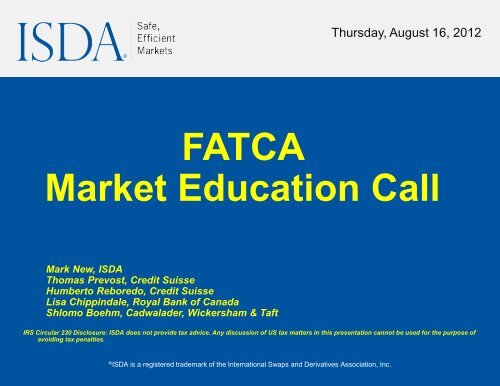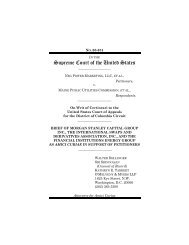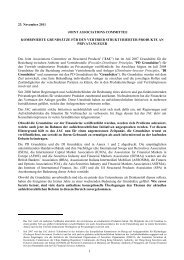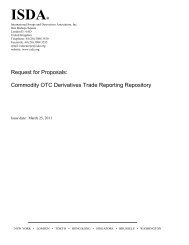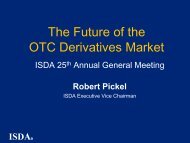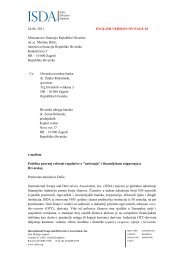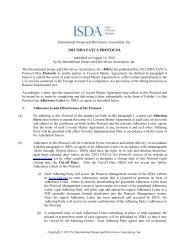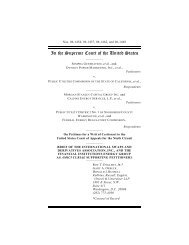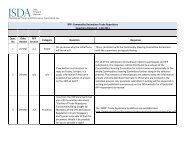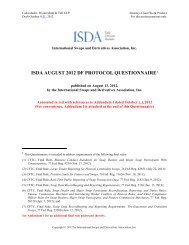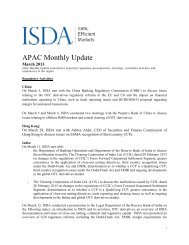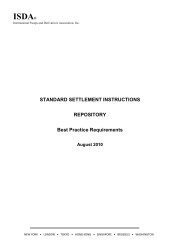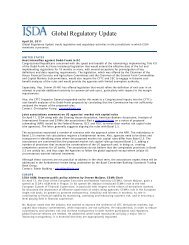Presentation (PDF) - ISDA
Presentation (PDF) - ISDA
Presentation (PDF) - ISDA
- No tags were found...
You also want an ePaper? Increase the reach of your titles
YUMPU automatically turns print PDFs into web optimized ePapers that Google loves.
Thursday, August 16, 2012FATCAMarket Education CallMark New, <strong>ISDA</strong>Thomas Prevost, Credit SuisseHumberto Reboredo, Credit SuisseLisa Chippindale, Royal Bank of CanadaShlomo Boehm, Cadwalader, Wickersham & TaftIRS Circular 230 Disclosure: <strong>ISDA</strong> does not provide tax advice. Any discussion of US tax matters in this presentation cannot be used for the purpose ofavoiding tax penalties.®<strong>ISDA</strong> is a registered trademark of the International Swaps and Derivatives Association, Inc.
What is FATCA?• U.S. tax rules created with the goal of giving the IRS better tools to audit U.S. citizens andresidents utilizing foreign accounts to evade U.S. tax on their worldwide income• Enacted in March 2010; effective January 1, 2013 with staggered implementation• Legislation provides the skeletal framework. However more details found in:• Proposed Regulations issued February, 2012; and• Model 1 Intergovernmental Agreement (IGA)• Provides for withholding on certain payments to foreign financial institutions (“FFIs”) that either(i) do not reside in an IGA Partner Country and/or (ii) do not enter into an agreement with IRSto document account holders and provide information on U.S. citizens and residents in theiraccount base to the IRS• U.S. payers must withhold on U.S. source payments, including dividends, interest, substitutedividends, substitute interest and gross proceeds from the sale of securities that they pay tonon-participating FFIs and any account holders that fail to provide adequate documentation• Payments can include payments made on collateral held for derivative trading.• Per guidance issued by the IRS/Treasury to-date, participating FFIs must withhold on allpayments they make to account holders that are non-participating FFIs or inadequatelydocumented individuals or non-financial foreign entities• Based on the Proposed Regulations, counterparties to derivatives transactions are consideredaccount holders1
Foreign Financial Institutions (“FFIs”)• An entity is an FFI if:• It is a deposit taking entity• As a substantial portion of its business it holds financial assets for the account ofothers; or• It engages primarily in the business of investing or trading in securities,commodities or partnership interest or any interest in such asset classes• Includes:• Banks, Credit Unions• Brokers, Dealers, Custodians, Clearing Organizations• Funds of all types (e.g., mutual funds, pension funds, hedge funds, private equityfunds, etc.)• Life insurance companies• Securitization vehicles• Investment trusts, corporations, partnerships• Note: Under the Model 1 IGA investment managers are also FFIs that must comply withthese requirements.• FFIs that do not either (1) enter into an agreement with Treasury or (2) qualify for one of thevery limited exclusions from FATCA, will suffer FATCA withholding tax on most paymentsthey receive2
Counterparties Other than FinancialInstitutions• FATCA classifies foreign entities as either foreign financial institutions (“FFIs”)or non-financial foreign entities (“NFFEs”)• NFFEs generally must provide documentation to establish they are non-USentities and documentation related to any substantial U.S. owners (generallyrequires a greater than 10% direct or indirect interest in the entity)• The Proposed Regulations provide lighter requirements for “Active NFFEs” andcertain other entities such as charitable organizations.• Non-U.S. individuals with US indicia must provide documentation to establishthat they are not U.S. persons; no FATCA reporting is required with regard tothese individuals• US entities and individuals will generally be required to provide documentationto establish their U.S. status; once documented as U.S., if “specified USPersons”, these counterparties are to be reported to the IRS in accordance withforthcoming FATCA requirements3
Relevant Differences from CurrentU.S. Withholding Rules• FATCA requires a participating FFI to obtain documentation from and report on substantialU.S. owners of non-financial foreign entities• FATCA withholding tax can apply to both U.S. source payments and to payments that mayeither be, or appear to be, foreign source payments• FATCA does not currently adopt the existing tax withholding and reporting exemptions forcertain types of U.S. payments (e.g. interest on T-bills, deposit interest)• This is of particular relevance when reviewing payments on collateral• FATCA required updates Forms W-8BEN-E and W-8IMY, which now require much greaterdetail.• Transition relief for old forms until they expire provided relevant FATCA information isalso recorded.• U.S. exempt recipients may need to provide FATCA documentation to a participating FFI• FATCA is a liability of the paying FI; while the paying FI may generally recover the tax fromthe recipient, the IRS will seek to recover from the paying FI, regardless of whether therecipient ultimately files an accurate and complete U.S. tax return• The legislation provides extremely narrow opportunities to obtain a refund of FATCAwithholding4
Pre-Existing Transactions(aka the “Grandfathering Rule”)• No withholding is required under FATCA on any payment made under any fixed term nonequityobligation outstanding on December 31, 2012 or from the gross proceeds from anydisposition of such an obligation.• The Master Agreement itself would not qualify for grandfathering relief since <strong>ISDA</strong> MasterAgreements do not typically have a fixed term• Transactions entered into under an <strong>ISDA</strong> Master Agreement should generally qualify forgrandfathering relief, provided they are entered into on or before December 31, 2012 andprovide for a fixed term• Payments on collateral may not qualify for grandfathering relief even where the collateral isheld in connection with a transaction entered into on or before December 31, 2012 since CreditSupport Annexes are not typically fixed term contracts and typically treat the pledging ofcollateral as a separate transaction that also does not provide for a fixed term• Material modifications to existing transactions may cause them to be treated as newtransactions, which may cause them to lose the grandfathering protection if modified afterDecember 31, 2012• Transferee’s right of substitution is potentially useful in minimizing FATCA withholdingapplicable to certain forms of collateral5
FATCA Creates Serious Financial RiskNon-Compliance RiskFFIs that do not enter into a FATCA Agreement with Treasury by December 31, 2013 and are not located ina country that has entered into an intergovernmental agreement with the US (each an “IGA Country”) arelikely to bear FATCA withholding tax on a variety of payments, potentially including, after December 31,2016, payments on “wholly foreign” transactionsAbsence of FATCA Language RiskParticipating FFIs and USFIs that do not modify their Master Agreements to address FATCA for transactionswith NPFFI counterparties are at risk for grossing up a counterparty for FATCA withholding tax on certaingross amounts payable.Note: FATCA tax is due on the gross amount payable to a counterparty, not the net paymentFATCA tax will be due on the payment itself plus on the tax paid on behalf of the counterparty,for a total effective withholding tax rate of 42.8%December 31, 2012 RiskTrades entered into or materially modified post December 31, 2012 will not qualify for grandfathering relief,so payments made after December 31, 2013 on such trades are potentially subject to FATCA withholding6
FATCA Risk & <strong>ISDA</strong> Master AgreementsFATCA tax applies to payments by an FFI/USFI to a non-FATCA compliant counterparty, so if allcounterparties are FATCA compliant, an FFI/USFI payer will not need to gross up for FATCA tax,even in the absence of FATCA language in an <strong>ISDA</strong>Trades Where FFI/USFI Payer is at Risk• Trades entered into or materially modified after December 31, 2012 with a term that extendsbeyond December 31, 2013 with a counterparty that is not FATCA compliant if FATCAlanguage is not contained in the <strong>ISDA</strong>• Collateral held beyond December 31, 2013 that generates US source payments to a nonFATCA-compliant counterparty where FATCA language is not contained in the MasterAgreementFATCA compliant counterparties include the following that provide adequate FATCAdocumentation to the payer:• A US person• An FFI located in an IGA Country that has not been identified as a non-participating FFI• An FFI located in a non-IGA Country that has entered into a Participating FFI agreement orotherwise qualifies for an exemption from FATCA withholding• A non-financial foreign entityNote: documentation requirements can be rather onerous for foreign entities7
FATCA Withholding Tax ExampleSample Master Agreement TradeOn December 31, 2012, a participating FFI (PFFI) and a non-participating FFI (NPFFI) enter into a 5 year on market equity swap on abasket of US equities; the terms of the swap are materially modified on December 31, 2014 (e.g., swap basket is changed)• The notional principal amount of the swap is 1,000,000,000 USD• NPFFI has posted 30,000,000 in US Treasuries with PFFI in connection with its derivatives trading activities that remain postedafter the swap is modified• The PFFI holds the US Treasuries in its US branch• Very basic assumptions have been made regarding interest and dividend rates for purposes of illustrationSwap Payment OverviewNo Gross UpGrossed Up• Periodic payments on swap on or prior to 12/31/2014 to NPFFI = 30MM; net pay13MM (assumes swap initially qualifies for grandfathering)• Periodic payments on swap after 12/31/2014 = 120MM; net pay 52MM• Interest with respect to collateral prior to 12/31/2013 = 150 M• Interest with respect to collateral after 12/31/2013 = 600 MFATCA Consequences0 036 MM; 15.6 MM 51.36 MM; 22.26 MM0 M 0 M180 M 256.8 MScenario 1: <strong>ISDA</strong> Master Agreement not updated for FATCA; FATCAprotocol not adopted by either party; swap not cleared through a clearingorganization(grossed up; tax on gross payment)Due to IRS = 36.8 MM USDParty economically responsible: PFFI(due to tax indemnity)Scenario 2: <strong>ISDA</strong> Protocol Adhered to by both parties; swap notcleared through a clearing organization(no gross up; tax on gross payment)Due to IRS = 51.616 MM USDParty economically responsible: NPFFI(due to absence of tax indemnity for FATCA tax)8
Relevant DatesDecember 31, 2012 Transactions entered into or substantially modified after this date may be subject to FATCA taxJanuary 1, 2013 Likely date FFIs can apply to become participating FFIs (no ability to collect required documents from a participatingFFI until it applies for participating FFI status, perhaps no ability for participating FFI to deliver documents until itsparticipating FFI-EIN is issued by the IRS)January 1, 2014 FATCA tax begins to apply to US source fixed, determinable, annual or periodical income – e.g., dividends, interest,substitute dividends (note, certain Chapter 3 exceptions to FDAP do not apply for FATCA purposes) FATCA tax applies to payments related to U.S. collateral (including USD cash and US Treasuries) and trades withU.S. assets or certain U.S. referenced assets when made to non-PFFIs and undocumented counterparties See <strong>ISDA</strong> FATCA market education note, available at www.isda.org, for more details regarding potential coveredpaymentsJanuary 1, 2015 FATCA tax begins to apply to US proceeds of sale See <strong>ISDA</strong> FATCA market education note, available at www.isda.org, for more details regarding potential coveredpaymentsJanuary 1, 2017 The earliest date on which FATCA tax could begin to apply to foreign passthru payments See <strong>ISDA</strong> FATCA market education note, available at www.isda.org, for more details regarding potential coveredpayments9
Relevant Existing <strong>ISDA</strong> Master AgreementLanguage2(d) (i) Gross Up. All payments under this Agreement will be made without any deduction orwithholding for or on account of any Tax unless such deduction or withholding is required byany applicable law, as modified by the practice of any relevant governmental revenue authority,then in effect. If a Party is so required to deduct or withhold, then that party (“X”) will: …(4) If such Tax is an Indemnifiable Tax, pay to Y, in addition to the payment to which Y isotherwise entitled under this Agreement, such additional amount as is necessary to ensure thatthe net amount actually received by Y (free and clear of Indemnifiable Taxes, whether assessedagainst X or Y) will equal the full amount Y would have received had such deduction orwithholding been required. However, X will not be required to pay any additional amount to Y tothe extent that it would not be required to be paid but for :--(A) The failure by Y to comply with or perform any agreement contained in Section 4(a)(i),4(a)(iii) or 4(d); or(B)The failure of a representation made by Y pursuant to Section 3(f) to be accurate and trueunless such failure would not have occurred but for (I) any action taken by a taxing authority,or brought in a court of competent jurisdiction, after a Transaction is entered into (regardlessof whether such action is taken or brought with respect to a party to this Agreement) or (II) aChange in Tax Law.10
<strong>ISDA</strong> 2012 FATCA Protocol LanguageThe following text shall be added to the Schedule to the Covered Master Agreement:1. “Withholding Tax imposed on payments to non-US counterparties under the United States Foreign Account Tax ComplianceAct. “Tax” as used in Part 2(a) of this Schedule (Payer Tax Representation) and “Indemnifiable Tax” as defined in Section 14of this Agreement shall not include any U.S. federal withholding tax imposed or collected pursuant to Sections 1471 through1474 of the U.S. Internal Revenue Code of 1986, as amended (the “Code”), any current or future regulations or officialinterpretations thereof, any agreement entered into pursuant to Section 1471(b) of the Code, or any fiscal or regulatorylegislation, rules or practices adopted pursuant to any intergovernmental agreement entered into in connection with theimplementation of such Sections of the Code (a "FATCA Withholding Tax"). For the avoidance of doubt, a FATCA WithholdingTax is a Tax the deduction or withholding of which is required by applicable law for the purposes of Section 2(d) of thisAgreement.”2. This Protocol and the amendments set forth in this Attachment shall replace any Express Provisions, where “ExpressProvisions” means:(a) any provisions expressly set out in any confirmation of a Transaction that supplements, forms a part of, and is subjectto, a Covered Master Agreement; or(b)any provisions expressly set out in any Schedule to a Covered Master Agreement;in either case, that provide for amendments to (i) any Payer Tax Representation contained in such Covered MasterAgreement, (ii) Section 2(d) of such Covered Master Agreement, or (iii) the definition of “Indemnifiable Tax” in such CoveredMaster Agreement, in each case, only in relation to FATCA Withholding Tax.11
Additional FATCA Related Considerationsfor <strong>ISDA</strong> Master Agreement Modification• Document delivery language for any documents required for FATCApurposes• Termination rights for either or both parties if FATCA withholding may apply• Broadening transferee’s right of exchange to facilitate minimal or nowithholding on collateral• Representations that there are no US persons that have more than a 10%beneficial interest (or a “controlling” interest) in a party to the MasterAgreement• Representations as to FATCA compliance where one party is required byrating agency considerations to gross up the other party for all taxes• Mutual agreement that neither party will delegate withholding responsibilityunder 1471(b)(3) of the Code to the other• Limitation on use of Master Agreement post January 1, 2013 absentinsertion of FATCA language12
Adherence Process• <strong>ISDA</strong> 2012 FATCA Protocol is open for adherence (as of August 15, 2012)• Early adherence is encouraged• No specific closing date• Adherence Process:• Access the Protocol Management section at www.isda.org (under"Functional Areas") to enter adherence information online and pay one-timeadherence fee• The Protocol Management system generates the party’s Adherence Letter‣ Includes Institution Letterhead upload‣ No changes to the Adherence Letter permitted (other than name, date and signatureblock)‣ Populated Adherence Letter can be received either by direct download or by e-mail• Print, sign and upload the signed Adherence Letter as a <strong>PDF</strong> attachment(no need to mail the signed original)• Once <strong>ISDA</strong> approves submission, Protocol Participant receives e-mailconfirmation of adherence• <strong>ISDA</strong> publishes conformed copy of Adherence Letter. The names of AdheringParties are published on the website and regularly updated.13
Questions?14


